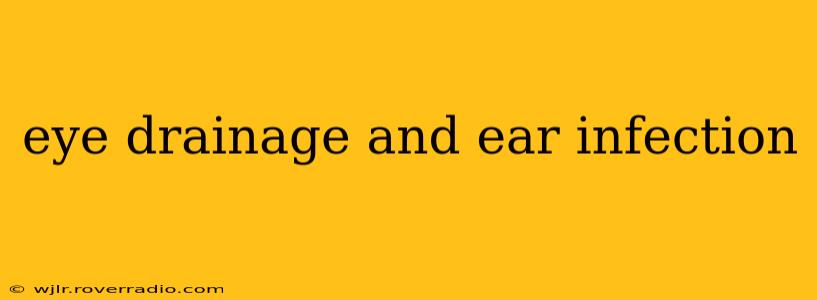Eye drainage and ear infections, while seemingly unrelated, can sometimes share underlying causes or occur concurrently due to the proximity of the eyes and ears. This article explores the potential connections between these conditions, common causes, and when to seek professional medical attention. We'll also address frequently asked questions surrounding this issue.
What Causes Eye Drainage and an Ear Infection Simultaneously?
The simultaneous occurrence of eye drainage and an ear infection isn't always directly linked. However, several factors can increase the likelihood of experiencing both conditions at the same time:
-
Viral Infections: Many viruses, such as adenoviruses and rhinoviruses, can affect the mucous membranes of both the eyes (causing conjunctivitis or "pink eye") and the ears (causing otitis media). The viral infection spreads through the body, impacting multiple areas.
-
Bacterial Infections: While less common than viral infections, bacteria can also cause both conjunctivitis and ear infections. These infections can spread similarly to viral infections, affecting adjacent areas. Streptococcus pneumoniae and Haemophilus influenzae are common culprits.
-
Allergies: Seasonal allergies or reactions to irritants can cause inflammation in the eyes (resulting in watery or mucus-like drainage) and potentially contribute to ear inflammation, particularly in individuals predisposed to ear infections. Allergic conjunctivitis can be accompanied by an allergic reaction in the ears, leading to discomfort.
-
Anatomical Proximity: The close proximity of the eyes and ears means that infection in one area can, in some cases, spread to the other, particularly in young children. This is more likely with bacterial or viral infections.
Can an Ear Infection Cause Eye Drainage?
While an ear infection itself is unlikely to directly cause eye drainage, the underlying cause—a bacterial or viral infection—could affect both areas. The infection might spread to the eyes, resulting in conjunctivitis, or the inflammation associated with the ear infection could trigger a response in the eyes in susceptible individuals.
Can Eye Drainage Cause an Ear Infection?
Similar to the previous question, eye drainage itself usually doesn't directly cause an ear infection. However, the underlying infection causing the eye drainage (like a bacterial or viral infection) could spread to the middle ear, leading to an ear infection.
What are the Symptoms of Eye Drainage and Ear Infection?
Symptoms of eye drainage can include:
- Watery discharge: Often clear and thin, characteristic of allergies or viral infections.
- Mucus-like discharge: Thick and potentially yellow or green, suggesting a bacterial infection.
- Itching: A common symptom of allergies or irritations.
- Redness and swelling: Inflammation around the eye.
Symptoms of an ear infection can include:
- Ear pain: Often intense and sharp.
- Fever: Especially in bacterial infections.
- Hearing loss: Temporary or permanent depending on the severity.
- Drainage from the ear: Potentially pus-like and foul-smelling.
- Feeling of fullness or pressure in the ear.
When Should I See a Doctor for Eye Drainage and an Ear Infection?
It's crucial to seek medical attention if:
- Symptoms are severe: Intense ear pain, high fever, or significant eye drainage.
- Symptoms persist: Conditions that don't improve after a few days of home care.
- Symptoms worsen: Progressive increase in pain, discharge, or other symptoms.
- You suspect a bacterial infection: Yellow or green discharge from the eye or ear, coupled with fever.
How are Eye Drainage and Ear Infections Treated?
Treatment depends on the underlying cause. Viral infections usually resolve on their own with supportive care (rest, fluids). Bacterial infections may require antibiotics. Allergies might be managed with antihistamines or other allergy medications. Your doctor will determine the appropriate course of action based on a thorough examination and assessment of your symptoms.
Disclaimer: This information is for general knowledge and does not constitute medical advice. Always consult a healthcare professional for diagnosis and treatment of any medical condition.
